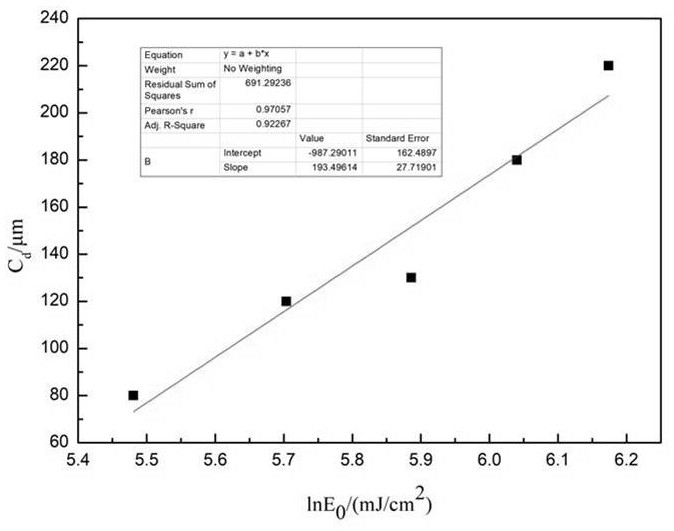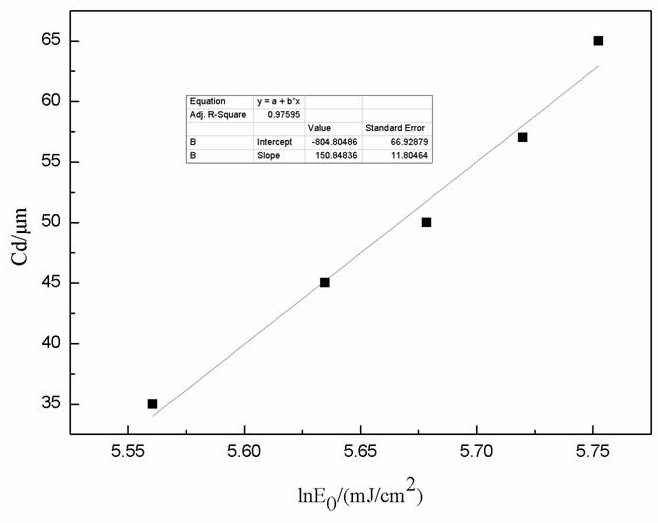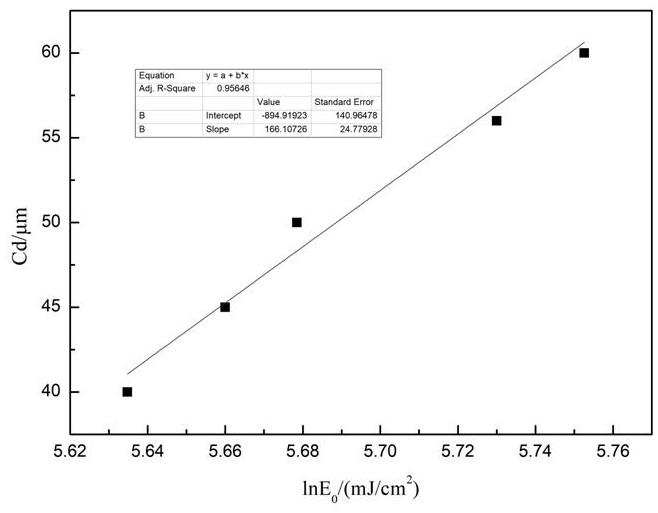A preparation method of photocurable 3D printing dyed dental zirconia ceramic slurry
A zirconia ceramic, 3D printing technology, applied in dental preparations, dentistry, dental prosthesis, etc., can solve the problems of single color, unsightly, and single color of dental crowns, and achieve operation time saving, high curing strength, and printing accuracy high effect
- Summary
- Abstract
- Description
- Claims
- Application Information
AI Technical Summary
Problems solved by technology
Method used
Image
Examples
Embodiment 1
[0020] (1) Weigh an appropriate amount of oxides according to the actual requirements of the tooth color: praseodymium oxide 0.02wt%, cerium oxide 0.1wt%, erbium oxide 0.3wt%, manganese oxide 0.01wt% (based on the quality of the ceramic powder), and the weighed The oxide and zirconia powder were dispersed by ball milling in absolute ethanol for 4 hours, and after the ball milling was completed, they were placed in an oven at 70°C for drying. After the drying was completed, they were ground and sieved to prepare ceramic powder for later use;
[0021] (2) According to the calculated photocurable resin formula, weigh 50wt% hydroxyethyl methacrylate (HEMA), 30wt% triethylene glycol diacrylate (TEGDA), 20wt% polyethylene glycol 400 , 2wt% 784+TPO mixed photoinitiator (relative to the quality of the resin monomer), heated and stirred in a water bath for 30 minutes, fully stirred evenly, and prepared into a photocurable resin for later use;
[0022] (3) Add the dyed ceramic powder pr...
Embodiment 2
[0025] (1) Weigh an appropriate amount of oxides according to the actual requirements of the tooth color: praseodymium oxide 0.01wt%, cerium oxide 0.1wt%, erbium oxide 0.2wt%, manganese oxide 0.01wt% (based on the quality of ceramic powder), and the weighed Trace oxides and ceramic powder were dispersed by ball milling in absolute ethanol for 4 hours. After ball milling, place in an oven at 80°C for drying. After drying, grind and sieve to prepare ceramic powder for later use;
[0026] (2) According to the calculated photocurable resin formula, weigh 50wt% propoxylated trimethylolpropane triacrylate (PO 3 -TMPTA), 30wt% 1,6-hexanediol diacrylate (HDDA), 20wt% polyethylene glycol 400, 2wt% 784+TPO mixed photoinitiator (relative to the quality of the resin monomer), Heat and stir in a water bath for 45 minutes, fully stir evenly, and prepare a photocurable resin for later use;
[0027] (3) Add the dyed ceramic powder prepared in step 1 to 50% of the total volume of the slurry (...
Embodiment 3
[0030] (1) Weigh an appropriate amount of trace oxides according to the actual requirements of tooth color: 0.01wt% of praseodymium oxide, 0.2wt% of cerium oxide, 0.2wt% of erbium oxide, 0.01wt% of manganese oxide (based on the quality of ceramic powder), and weigh The trace oxides and ceramic powder were dispersed by ball milling in absolute ethanol for 5 hours. After the ball milling was completed, they were placed in an oven at 90°C for drying. After the drying was completed, they were ground evenly and sieved to prepare ceramic powder for later use;
[0031] (2) According to the calculated photocurable resin formula data, weigh 50wt% of trimethylolpropane diacrylate (TMPDA), 30wt% of isooctyl acrylate (EHA), 20wt% of polyethylene glycol 400, 2wt% 784+TPO mixed photoinitiator (relative to the mass of the resin monomer), heated and stirred in a water bath for 60 minutes, fully stirred evenly, and prepared into a photocurable resin for later use;
[0032] (3) Add the dyed cer...
PUM
| Property | Measurement | Unit |
|---|---|---|
| strength | aaaaa | aaaaa |
| bending strength | aaaaa | aaaaa |
| Vickers hardness | aaaaa | aaaaa |
Abstract
Description
Claims
Application Information
 Login to View More
Login to View More - R&D
- Intellectual Property
- Life Sciences
- Materials
- Tech Scout
- Unparalleled Data Quality
- Higher Quality Content
- 60% Fewer Hallucinations
Browse by: Latest US Patents, China's latest patents, Technical Efficacy Thesaurus, Application Domain, Technology Topic, Popular Technical Reports.
© 2025 PatSnap. All rights reserved.Legal|Privacy policy|Modern Slavery Act Transparency Statement|Sitemap|About US| Contact US: help@patsnap.com



